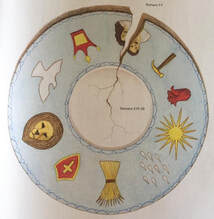Drippings from the Honeycomb
More to be desired are [the rules of the Lord] than gold, even much fine gold; sweeter also than honey and drippings of the honeycomb. (Psalm 19:10)
|
True saving, or justifying, faith is the main grounds of Christianity.
Galatians 2:16 says that “we know that a person is not justified by works of the law but through faith in Christ.” It is through faith that we are saved from damnation. It is by faith that we are declared just or right before God. It is in faith that all the blessings of Christ are given to the unworthy. Yet what is this faith? There are 4+1 necessary elements of saving faith: hear, agree, turn and trust.
3. TURN: The Gospel calls us to respond. This response involves turning (repenting) from our sin, changing our mind, changing direction. We turn from sin and toward Christ. (poenitentiam- to show penance, or sorrow; to change direction; to change one’s mind. From the Greek μετάνοια). a. “Repent and believe in the Gospel.” (Mk 1:15)
All of this can of course appear as if it happens in a moment. For example someone could hear the Gospel, assent to it, recognize without convincing their life is on the wrong path turn and trust in an instant. Or one could hear the Gospel many times, wrestle with believing it to be true, wrestle with their sin and finally come to a place where they actually trust in Jesus. Conversion is like an accordion, either all bunched up or discernible over time. Regardless these are the steps the Bible lays out for us to discern saving faith. So we must hear, agree, turn and trust in order to be saved and we know someone is saved because they persevere in trusting Christ’s promises and commands. See Paul and James.
This is the test of faith we ought to look for in ourselves and in those who profess to be Christians. "Justification is the doctrine on which the Church stands or falls," Martin Luther once said, yet two visible branches of Christianity, Catholic and Protestant, differ widely on what justification is. Explore these two different views in the document below.
One of the most common Bible questions that exists is, “Are Paul and James in contradiction when they speak of justification?” (I.e. Does Paul teach justification by faith alone and James by faith and works?).
Paul says, “For we hold that one is justified by faith apart from works of the law” (Ro 3:28) and “Abraham believed God, and it was counted to him as righteousness [or justification]” (Ro 4:3b, c.f. Gal 3:6). James says, “You see that a person is justified by works and not by faith alone.” (Ja 2:24) The short answer is NO, they are not in contradiction (for with God as its author, Scripture is never in confusion). One may easily rectify the apparent contradiction when you consider how they are using the word and the illustrations they draw from Abraham’s life. Let’s start with the illustration. Paul is citing the story of the Abrahamic Covenant found in Gen 15:6 (c.f. Gen 12). When Abraham believed God’s promise God declared Him righteous or just. Abraham was justified by faith. By contrast, James is citing the story of Abraham and Isaac found in Gen 22:9–10 (Ja 2:21). This then sees Paul and James using the same word in different senses. Paul is using the word savingly whereas James is using it demonstratively. Paul is saying Abraham was declared just through his faith. James is saying Abraham showed himself as having been justified by faith through his works. Obedience (or works) proves faith, it is the fruit of saving faith, never the cause of it. One must have a comprehensive view of God’s plan of salvation. The same God who justifies us also sanctifies us by His Spirit, persevering us until our glorification. Our good works don’t save us but do show that we are saved (Tit 2:10). The Old Baptist confession put it this way: “Faith thus receiving and resting on Christ and his righteousness, is the alone instrument of justification; yet it is not alone in the person justified, but is ever accompanied with all other saving graces, and is no dead faith, but worketh by love. (1689.11.2) What is the biblical teaching (doctrine) of justification by faith alone (known in Latin as sola fide)? Martin Luther said it is “Easy to talk about; difficult to grasp.” Yet because justification answering the question, "what must I do to be saved (or justified)?" it is of fundamental importance. This is why Martin Luther said it was, “the doctrine on which the Church stands or falls,” and John Calvin would likewise describe it as “the hinge on which all true religion turns.”
 Justification means to declare someone as just, righteous or perfect. Justification is necessary because of our sinfulness and inability to justify ourselves. God's demand is perfection (Mt 5:48). Yet who can keep the whole moral law every day all the time? No, if we break one law (Ja 2:10) we are a lawbreaker and guilty before the Judge and deserving of hell. Justification is the irrevocable and instantaneous act whereby God, by virtue of the finished work of Christ in His life, death and Resurrection, declares the penitent believer in the Gospel to be not only pardoned but just, right or perfect in His sight. Jesus’ righteousness is imputed, or credited, to our account. It follows that we are made acceptable to God, gain acceptance into His family and receive the gift of the Spirit to practically impart righteousness (or justness) until the day we are actually made just. Justification is the great fountainhead in the order of salvation. Read more here.  Justification teaches us that we are helpless to help ourselves. Our works cannot save us. We may only be saved by the works of another. This is perhaps best illustrated by quicksand. When stuck in quicksand one must be rescued by the works of another. If we move we sink. We must cry out that someone else rescue us and trust them to do so. When we confess we are sinners (recognize we are in trouble) and repent (turn from our works to Jesus), turning instead to the Son of God (perfect, crucified and risen) and ask Him to forgive us and grant us eternal life by virtue of what He has done then He promises to forgive us and impute His righteousness to us. He bears our sin and in return we receive His righteousness and resurrection life. My hope is built on nothing less...all other ground is sinking sand. |
Featured BlogsLearn about Jesus Author:
|
||||||||
LocationPO Box 73,
144 Lorne Street, Markdale N0C 1H0 |
Join by zoom |
Contact us |
Donate |
|